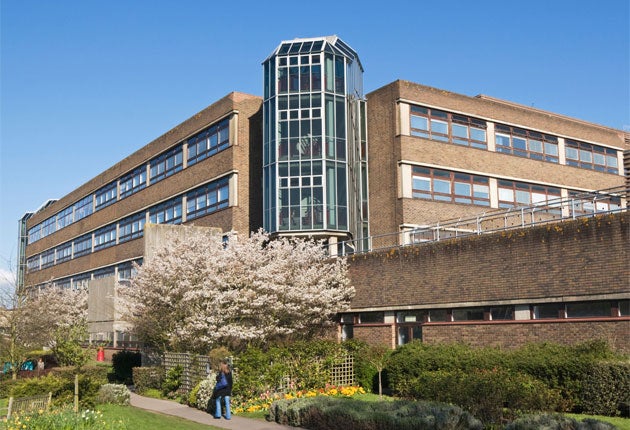Patients' drugs 'were exported for profit'
Trust sold millions of pounds' worth of medicine intended for NHS use

An NHS trust hospital sold millions of pounds' worth of drugs intended for NHS use on to the export market because it saw an opportunity to make a quick profit. It later defended its activities on the grounds that trusts had been encouraged to be "entrepreneurial", and continued the practice for six months after government warnings that its behaviour was "unacceptable".
The disclosure of the activities of the Royal Surrey County Hospital will add to concern about the working of the market in the NHS and its impact on the supply of medicines. Serious shortages have been reported around the country of more than 40 well-known drugs used to treat a range of conditions including high blood pressure, cancers and epilepsy.
Last week, Mike O'Brien, the Health minister, castigated "unscrupulous people" who were "putting profits before people" by selling drugs abroad. He announced an emergency summit on the supply of medicines early next month and said it was unacceptable that patients were having to wait to obtain the drugs they needed.
Speculators including wholesalers and some pharmacists have sold drugs to Europe, where prices are higher because of the weak pound. NHS patients have been unable to obtain drugs they needed or had to wait while pharmacists scoured the country for supplies.
The Royal Surrey County Hospital was awarded foundation trust status in December, partly as a result of an improvement in its financial performance.
Over a period of 10 months the trust made a profit of £300,000 by buying up drugs at the NHS price and selling them to a wholesaler for export, according to the Health Service Journal. It ended the practice last month – six months after the Department of Health branded the trading "wholly unacceptable" and said it threatened the safe supply of medicines to the NHS, the magazine reported.
The Royal Surrey's finance director Paul Biddle told the Health Service Journal: "Yes, we did see this as an opportunity to make a margin. I felt we hadn't anything to hide in this. It was openly declared when we went through assessment with Monitor [the foundation trust regulator]. They have always encouraged trusts to be entrepreneurial."
Mr Biddle said the trust had not sold any drugs in short supply on the NHS but declined to supply a list of the drugs that had been sold on the grounds that it was "commercially sensitive".
The trust ceased trading in the drugs in January partly in response to growing concern about the practice and partly as a result of the fall in the value of the euro from a peak of 94p in October to 86p, reducing the scope for profit.
According to the Health Service Journal, a whistleblower in the south-east region of the NHS first alerted the Department of Health that a trust in the region was suspected of trading drugs for export.
The NHS Purchasing and Supply Agency's principal pharmacist Howard Stokoe responded to the whistleblower in an email on 27 May saying the spread of export trading to acute hospitals was a "serious concern" due to the relatively small volumes of drugs supplied to hospitals.
Mr Stokoe wrote: "Quite simply, if product is diverted in this way it is likely to have an immediate and dramatic impact on the availability of product to treat UK patients. Not only would this compromise patient care, it would also be damaging for the reputations of any NHS trusts involved in this practice."
The Department of Health's chief pharmacist Keith Ridge subsequently wrote to all hospital chief pharmacists last July saying it was "wholly unacceptable" and "irresponsible" for NHS hospitals to export drugs. However, the Royal Surrey continued to trade for another six months.
Mr Biddle told the Health Service Journal: "We absolutely assured ourselves the drugs being supplied were freely available. There was no question of diverting drugs needed for the NHS. But because of the publicity and the fact it was a short-term accountancy opportunity we saw it for only a limited period. So we stopped as of January 2010."
A spokesman for Monitor said that as long as the drug trading did not affect UK patients or the ability of the trust board to focus on its core responsibilities it was "not an issue on which we would take a view".
In a statement last night, the Royal Surrey said it had a "history of manufacturing and supplying drugs to other health care organisations under a licence which we hold".
It added: "We have more recently also supplied a wholesaler with drugs that are widely available. The amount of income received from this source in 2009-10 is estimated at £4.6m, contributing a margin to the trust of around 6 per cent, i.e. £300,000. At no time were drugs supplied which were on the list of drugs in short supply."
A Department of Health spokesperson said: "The Department is aware of a report that a hospital has considered trading in medicines for short-term financial gain. Such activities are wrong and threaten the medicines' supply chain and patient care."
Subscribe to Independent Premium to bookmark this article
Want to bookmark your favourite articles and stories to read or reference later? Start your Independent Premium subscription today.

Join our commenting forum
Join thought-provoking conversations, follow other Independent readers and see their replies